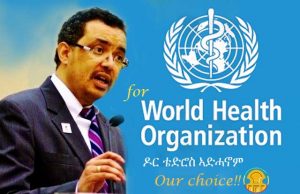
Kinshasa, Democratic Republic of Congo, May 14, 2018// — The World Health Organization (WHO) and a broad range of partners are in the Democratic Republic of the Congo (DRC) working with the government to contain the new outbreak of Ebola virus disease (EVD) in Bikoro health zone in the Equateur Province.
The outbreak was declared three days ago.
WHO Director-General Dr Tedros Adhanom Ghebreyesus is expected to travel to the DRC over the week-end to take stock of the situation and direct the continuing response in support of the national health authorities.
As of 11 May, 34 Ebola cases have been reported in the area in the past five weeks, including 2 confirmed, 18 probable (deceased) and 14 suspected cases. Five samples were collected from 5 patients and two have been confirmed by the laboratory.
Bikoro health zone is 250 km from Mbandaka, capital of Equateur Province in an area of the country that is that is very hard to reach.
“WHO staff were in the team that first identified the outbreak. I myself am on my way to the DRC to assess the needs first-hand,” said Dr Tedros.
“I’m in contact in the Minister of Health and have assured him that we’re ready to do all that’s needed to stop the spread of Ebola quickly. We are working with our partners to send more staff, equipment and supplies to the area.”
A multidisciplinary team including WHO experts, along with staff from the Provincial Division of Health and Médecins Sans Frontières (MSF), arrived in Bikoro on 10 May.
This first group of responders is now gathering more data to understand the extent and drivers of the epidemic.
The team will also set up an active case search and contact tracing, establish Ebola treatment units to care for patients, set up mobile labs, and engage the community on safe practices.
WHO will also work with national authorities in planning further public health measures such as vaccination campaigns.
“WHO is supporting the Government of the Democratic Republic of the Congo in coordinating this response; this is the country’s ninth Ebola outbreak and there is considerable expertise in-country,” said Dr Matshidiso Moeti, WHO Regional Director for Africa.
“However, any country facing such a threat may require international assistance. WHO and its partners including MSF, World Food Programme (WFP), UNICEF, International Federation of Red Cross and Red Crescent Societies (IFRC) and the Congolese Red Cross, UNOCHA and MONUSCO , US Centers for Disease Control and Prevention (US-CDC), the International Organization for Migration (IOM), are all stepping up their support.”
The response plan to the outbreak includes surveillance, case investigation, and contact tracing; community engagement and social mobilization; case management and infection prevention and control; safe and dignified burials; research response including the use of ring vaccination and antivirals; and coordination and operations support.
“It is too early to judge the extent of this outbreak,” said Dr Peter Salama, WHO Deputy Director-General for Emergency Preparedness and Response.
“However, early signs including the infection of three health workers, the geographical extent of the outbreak, the proximity to transport routes and population centres, and the number of suspected cases indicate that stopping this outbreak will be a serious challenge. This will be tough and it will be costly. We need to be prepared for all scenarios.”
In its latest Disease Outbreak News, WHO lists the risks to surrounding countries as moderate. WHO has however, already alerted those countries and is working with them on border surveillance and preparedness for potential outbreaks. WHO does not at this time advise any restrictions on travel and trade to the Democratic Republic of the Congo.
African Eye Report


